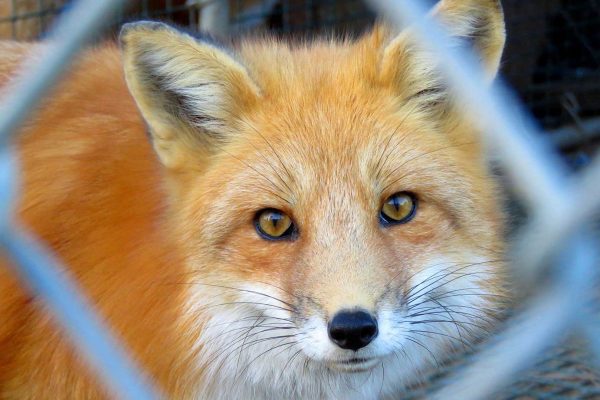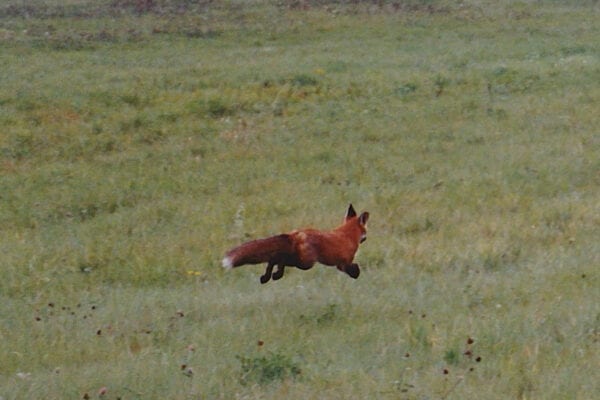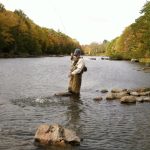I wasn’t sure what this month’s column would be about, but I needn’t have worried. Don always has a story or two (or more) to tell about the critters and experiences at the Duck Pond Wildlife Care Center! After more than over 50 years in wildlife rehab, you’d think that he’s seen about everything, but he was anxious to tell me about the release of two red foxes a couple of weeks ago.

Fox at Duck Pond Wildlife Center. Photo by Jayne Winters
He and volunteer Jeff had taken the sibling foxes to an area near a gravel pit for release. The foxes had been placed in individual large pet carriers and tolerated the ride to the release site very well. The first to be released cautiously headed down a gravel road and around the corner, out of sight. The second fox followed a few minutes later, in the same direction, so Don and Jeff quietly went down the road to see where they had gone. There was a flooded area across part of the road, significantly larger than just a rain puddle. Don was surprised to see one of the foxes standing belly deep in the middle of the water, not drinking or playing, just standing statue still. The other fox was on the edge of the water, but gradually waded over to where his brother was, working his way into the deeper part. They eventually left the pool of water and leisurely made their way into a nearby wooded area. While this may not sound especially noteworthy to us, Don said he had never seen anything like it in his many years of working with foxes. Although he always releases wildlife into areas with streams or ponds, he has never seen foxes swimming or standing in water much above their “ankles.”
Of course, I had to Google “Do foxes swim?” and learned that although canines, like our pet dogs, they don’t generally swim “for fun” unless they’re overheated, trying to escape a predator, or looking for food, such as ducks or fish. They keep their noses in the air and their tails straight, doing the familiar “doggy paddle.” However, they’re not strong swimmers, averaging two to three miles an hour and usually try to avoid water since they don’t enjoy getting wet. Of particular interest, one article I read stated, “They may even try to stay away from puddles if they are capable of doing so.” Don and I guessed that the foxes in this story sought relief from the hot and humid weather of the past couple of weeks by cooling off in the water before striking out to explore their new surroundings.
There were two admissions during the hour I visited with Don last Sunday. The first was a young gray squirrel which apparently had a foot injury from an encounter wi

A fox being released a few years ago from rehabilitation at the Duck Pond Wildlife Center. Photo courtesy of Duck Pond Wildlife Center
th a dog. It didn’t appear to be broken, but Don will further examine and observe it. Hopefully, a little TLC and rest will be all that’s needed.
The second critter was an opossum that had been found by the side of the road. Initially, the couple who saw it were able to encourage it to move away from the asphalt, but noted later that it had returned and was quite lethargic. They were able to get it into a plastic tote and brought it to Don. At cursory examination, Don suspected it had run into the tire of a passing car as there was obvious jaw injury, but no evidence of body abrasion or bleeding. It was semi-feisty, which is always a good sign in wild animals brought into human contact, and seemed to be healthy otherwise. It will be fed milk and vitamins with a syringe for a while and eventually canned cat food mixed with milk in a blender until its jaw has healed enough for semi-solid food. Don noted that trying to set and wire the jaw would stress the animal, reducing its chance of survival; Mother Nature is often the best healer.
As noted above, other rehabbers are generously providing assistance to help keep critter care at Duck Pond manageable. They are greatly appreciated! Please check the following websites to see if there is a rehabber near you: www.mainevetmed.org/wildlife-rehabilitation or www.maine.gov/ifw/fish-wildlife/wildlife/living-with-wildlife/orphaned-injured-wildlife/index.html
Donald Cote operates Duck Pond Wildlife Care Center on Rte. 3 in Vassalboro. It is a nonprofit, State-permitted rehab facility, which is supported by his own resources and outside donations. Mailing address: 1787 North Belfast Avenue, Vassalboro ME 04989 Phone: (207) 445-4326. Please note that the prior wildlifecarecenter email address is no longer monitored.
—by Jayne Winters, Natural Resources Council of Maine member from South China, Maine
Critter Chatter also appears monthly in the Town Line newspaper.












Leave a Reply